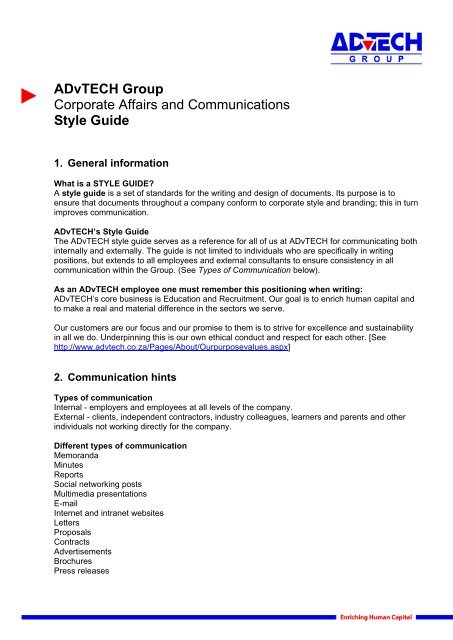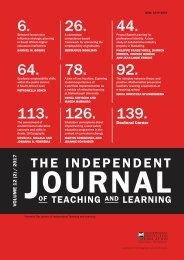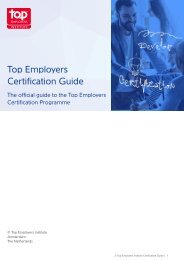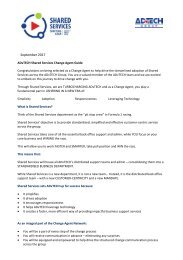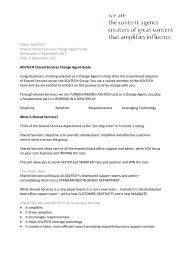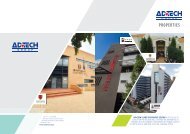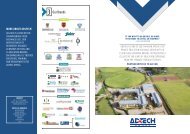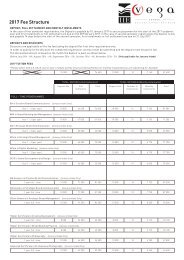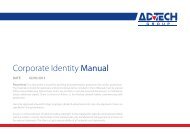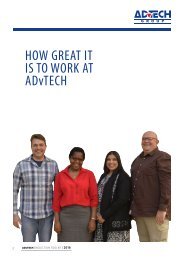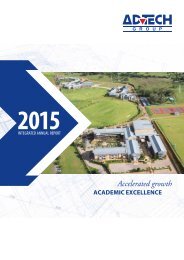ADvTECH Style Guide | Jan 2017
Jan 2017 Revision
Jan 2017 Revision
Create successful ePaper yourself
Turn your PDF publications into a flip-book with our unique Google optimized e-Paper software.
<strong>ADvTECH</strong> Group<br />
Corporate Affairs and Communications<br />
<strong>Style</strong> <strong>Guide</strong><br />
1. General information<br />
What is a STYLE GUIDE?<br />
A style guide is a set of standards for the writing and design of documents. Its purpose is to<br />
ensure that documents throughout a company conform to corporate style and branding; this in turn<br />
improves communication.<br />
<strong>ADvTECH</strong>’s <strong>Style</strong> <strong>Guide</strong><br />
The <strong>ADvTECH</strong> style guide serves as a reference for all of us at <strong>ADvTECH</strong> for communicating both<br />
internally and externally. The guide is not limited to individuals who are specifically in writing<br />
positions, but extends to all employees and external consultants to ensure consistency in all<br />
communication within the Group. (See Types of Communication below).<br />
As an <strong>ADvTECH</strong> employee one must remember this positioning when writing:<br />
<strong>ADvTECH</strong>’s core business is Education and Recruitment. Our goal is to enrich human capital and<br />
to make a real and material difference in the sectors we serve.<br />
Our customers are our focus and our promise to them is to strive for excellence and sustainability<br />
in all we do. Underpinning this is our own ethical conduct and respect for each other. [See<br />
http://www.advtech.co.za/Pages/About/Ourpurposevalues.aspx]<br />
2. Communication hints<br />
Types of communication<br />
Internal - employers and employees at all levels of the company.<br />
External - clients, independent contractors, industry colleagues, learners and parents and other<br />
individuals not working directly for the company.<br />
Different types of communication<br />
Memoranda<br />
Minutes<br />
Reports<br />
Social networking posts<br />
Multimedia presentations<br />
E-mail<br />
Internet and intranet websites<br />
Letters<br />
Proposals<br />
Contracts<br />
Advertisements<br />
Brochures<br />
Press releases
3. Your audience<br />
To communicate effectively, you need to ask yourself:<br />
Who is your audience?<br />
What are you trying to achieve?<br />
What do you want the audience to do?<br />
What will the audience think of <strong>ADvTECH</strong>?<br />
Your writing style depends on your audience and purpose. Some examples follow.<br />
Academic – you’re giving potential students and parent’s information about a degree [Extract from<br />
The Independent Institute of Education Bachelor of Business Administration]<br />
“The Bachelor of Business Administration is aimed at students who are business minded and are<br />
interested in a career in management administration. Business administrators and managers with<br />
the skills to plan, organise, direct, control and review daily operations and major functions of a<br />
business are rare in South Africa and this programme is designed to prepare graduates with the<br />
necessary skills to fill this gap.”<br />
Descriptive – you’re describing an event, a state of mind etc. [Extract from ADvNET, ‘Eight tips for<br />
becoming a more confident public speaker’<br />
“I had stage fright before and whenever I started speaking, my face would turn red and I'd look like<br />
I was about to start crying at any moment. Using these eight steps I overcame my fear, and even<br />
became a public speaking addict in the end.”<br />
Persuasive [Extract from ADvNET Investment insights for 2016]<br />
“This business fits succinctly into the space between the lower-end government schools and the<br />
high-end private schools and speaks to the growing emerging middle class in South Africa.<br />
<strong>ADvTECH</strong> is planning to increase prices by 6-10% in 2016. With current cost of capital between<br />
10-12% and targeted return of 20%, we calculate a positive impact on margins.”<br />
Expository – giving the facts [Extract from ADvNET Group IT reduces operational costs and<br />
increases profit]<br />
“Group IT's recent endeavours to streamline <strong>ADvTECH</strong>'s telecommunication spend serves as the<br />
perfect example of actions that have resulted in the creation of a competitive advantage. It was<br />
identified that moving from <strong>ADvTECH</strong>'s previous telecommunication's billing system to Telkom's<br />
'per second billing' could offer <strong>ADvTECH</strong> large savings - 1.5 % on local calls and as much as 6 %<br />
on national calls. Over the course of a three-year contract, this is a saving of over R5 million.”<br />
Compare and contrast [Extract from ADvNET Online Professional Development for Educators]<br />
“It was noted at the outset that with more than 400 000 educators in the South African system,<br />
print- and contact-based approaches to supporting professional development were neither efficient<br />
nor cost-effective. On the other hand, SACE had few registered providers of online professional<br />
development services. The seminar therefore sought to understand the issues and debates<br />
regarding online professional development.”<br />
Narrative – telling the story [Extract from ADvNET CEO Roy Douglas ‘Welcome back message<br />
2016’]<br />
“2016 promises to be just as exciting, with many more challenges but hopefully we will enjoy more<br />
success. I am excited by the opportunities that lie ahead, and I look forward to working with you all<br />
and bringing these to fruition.”<br />
The golden rule is to write clearly and precisely.<br />
Page 2 of 9
4. Content <strong>Style</strong> <strong>Guide</strong><br />
Abbreviations and Acronyms<br />
Always spell out acronyms when you first refer to them – remember, others may not know what<br />
they stand for! The next time you refer to them you can then use the abbreviation.<br />
APS = <strong>ADvTECH</strong> People Solutions<br />
BEE = Black Economic Empowerment<br />
CEO = Chief executive officer<br />
CSI = Corporate Social Investment<br />
HESIO =<br />
H = Human Resources<br />
E = Employment Equity<br />
S = Skills and Development<br />
I = Investing in Employees<br />
O = Occupational Health and Safety<br />
H/ O = Head Office<br />
HR = Human Resources<br />
LDP = Leadership Development Programme<br />
MDP = Management Development Programme<br />
The IIE – The Independent Institute of Education<br />
American Spelling<br />
No American spelling – behaviour, not behavior – programme, not program.<br />
Generally program is used for a software or computer program. Programme is used for a school<br />
programme, concert programme etc. Standardise on ‘s’ instead of ‘z” for words like realise, not<br />
realize; amortise, not amortize<br />
Your Word programme and spell checker should be set for SA English or UK English.<br />
Ampersand<br />
Ampersand (&) - change to ‘and’.<br />
Apostrophes<br />
• MDs not MD’s (plural, not possessive)<br />
• Six months’ time, R10 millions’ worth, no month’s or million’s.<br />
• It’s for it is and its for the possessive. For example: It’s going to be a profitable year. The<br />
Board plans its meeting annually.<br />
Brand names:<br />
<strong>ADvTECH</strong><br />
ADvNET<br />
ADvTALK<br />
ADvTALENT<br />
Head Office<br />
<strong>ADvTECH</strong> Group<br />
AND – know the names of all our brands – see Annexure 1.<br />
Campus<br />
Refrain from using “campus” for all locations within the Group:<br />
• Campus is used for Tertiary<br />
• Schools is used for Schools<br />
• Site is used for Resourcing<br />
Capitals<br />
Capitals, as per decision made by Didier for the interims 2016 – Everything should be lowercase.<br />
Page 3 of 9
Unless used as a title of a section, sub-section, signature or official name e.g. company, an act or<br />
department.<br />
• If writing ‘The tertiary division’ and ‘The schools division’<br />
• If writing ‘division’ only, the d is lower case<br />
• The board<br />
• The directors<br />
• The group<br />
• The board of directors<br />
• The HESIO committee<br />
• The transformation, social and ethics committee<br />
• Title in signature - Independent non-executive director, (First word capital only)<br />
• If in general: group financial director<br />
• Lower case: director<br />
• Exco<br />
• chief executive officer (CEO)<br />
• chairman or chairperson)<br />
Colon<br />
Colons are used to make lists or to separate one idea from the one which follows. E.g.:<br />
On the agenda: finalise induction programme, check brochure costs and write up reports.<br />
I’m soaking wet: I forgot my umbrella.<br />
Use a single space following the colon. Place colons outside quotation marks when used together.<br />
Commas<br />
• Use when setting off the year in a date that includes a month and a day, e.g. <strong>Jan</strong>uary 1, 2016<br />
• Do not use a comma when no day is given, e.g. <strong>Jan</strong>uary 2001.<br />
• In a series consisting of three or more elements, place the elements with commas.<br />
• When a conjunction (like, and, or) joins the last two elements in a series, there is no comma<br />
before the conjunction.<br />
E.g.: He has a choice between Vega, Wits and UNISA to do his honours degree.<br />
Composition<br />
The rule of thumb is one paragraph to each topic.<br />
Contractions<br />
For more formal communication avoid shortened forms such as ‘isn’t’, ‘wasn’t’ etc. unless you are<br />
quoting someone.<br />
Dash<br />
Use an em dash (—) to set apart entire phrases from the main body of a sentence and separate<br />
the dashes from the words that precede and follow it with a space.<br />
E.g. He waited for the bus — in the rain — for over an hour.<br />
Degrees<br />
• Use bachelor’s degree or master’s degree when not referring to an actual degree. E.g.:<br />
After completing a master’s degree, she went on to lecture.<br />
• Use capitals when referring to a degree: e.g. Bachelor of Science degree or Master of Arts<br />
degree. (Not bachelor’s of science degree or master’s of arts degree.) Use doctoral degree<br />
or doctorate, but not doctorate degree.<br />
• Abbreviated degrees generally don’t take a full stop BA, BEd, MBA, PhD.<br />
e.g., i.e.<br />
Page 4 of 9
The abbreviation “e.g.” means “for example.” The abbreviation “i.e.” means “that<br />
is” and should be used when expanding on a topic.<br />
E-mail<br />
Lowercase, with hyphen. Short form of electronic mail. In text, italicise the e-mail address - do not<br />
underline it.<br />
Emphasis<br />
To emphasise text, use bold or italics, not underlining.<br />
English<br />
Always capitalise.<br />
Exclamation point<br />
Use with discretion!<br />
Forum, forums and other tricky plurals<br />
Avoid the use of ‘fora’. You can say ‘symposia’ but ‘symposiums’ is also acceptable. However,<br />
there are words that should be pluralised in this way, e.g. criterion / criteria; phenomenon /<br />
phenomena.<br />
Headings<br />
Leave a blank line, or its equivalent in space, after the title or heading of a document. Begin on first<br />
line if continued to next page.<br />
Honours<br />
Use a capital ‘H’ when referring to a specific Honours Programme, requirements and the degree. If<br />
used generically (e.g., journalism honours courses), then lowercase. The correct abbreviation is<br />
e.g. BAHons, BComHons.<br />
Hyphens<br />
• Use hyphens after prefixes such as non-, pre-, and re- (e.g. non-aligned, pre-ordained) and<br />
when the last letter of the prefix and the first letter of the following word are the same: preengineering,<br />
co-ordinator.<br />
• There are some compound words that are hyphenated, e.g. mother-in-law, out-of-date.<br />
• When two words describe something, they are hyphenated to enhance clarity. Examples<br />
are: well-known author, bluish-green colour.<br />
Note also:<br />
o Year-end; e-Recruitment; full-time / part-time.<br />
• A hyphen may also be used to mean: to, up to and including, or through a range of<br />
numbers, dates, pages and so on.<br />
o Frank Thompson <strong>ADvTECH</strong> CEO (2002-2016)<br />
Initials<br />
No space between two initials preceding the last name: CJ Mkize, not C J Mkize.<br />
Language<br />
Set language to UK English (Spelling, Grammar, Punctuation and Vocabulary).<br />
Common American spelling errors:<br />
No “z” to be used if an “s” can be used, e.g. emphasise should be used, not emphasize.<br />
All words that require a “u” should contain a “u”, e.g. favour as opposed to favor.<br />
Avoid errors such as ‘comprises of’ - it’s just ‘comprise’. Don’t confuse terms such as ‘irritate’ and<br />
‘aggravate’: irritate = annoying; aggravate = to make worse.<br />
Page 5 of 9
Latin phrases<br />
Italicise Latin phrases.<br />
Master’s<br />
Use an apostrophe (possessive) when referring to the degree: master’s program, master’s degree,<br />
a master’s in communication.<br />
Names<br />
When communicating via email or letters use a person’s full name: first name. Or, if the person<br />
prefers, use first initial and last name. Use the global address list as a reference. Double check<br />
with the individual if there is any doubt.<br />
Numbers<br />
• 1 300, not 1300 or 1,300<br />
• Single space between number and word, e.g. R2 million, not R2million<br />
• One to ten written out; from 11 upwards, use numbers<br />
• Do not spell out dates or other serial numbers, write as figures.<br />
• At the start of a sentence, write out the number. E.g. Twelve days passed before we got an<br />
answer.<br />
On<br />
Do not use “on” prior to a date or day of the week: The meeting will be held Monday. The workshop<br />
is held 20 <strong>Jan</strong>uary.<br />
Online<br />
One word, no hyphen.<br />
Parenthesis (bracket)<br />
Parentheses are the marks which show that something is not really important but is still worth<br />
mentioning. E.g. His laptop (but not his cell phone) is on his desk.<br />
Parentheses can also be used when there is information which should be given, but it’s not enough<br />
to have its own sentence. E.g. We (Jenny, Nomvula and Michael) have made our plans for<br />
Mandela Day.<br />
Generally used are round brackets (…).<br />
When a whole sentence is in brackets, the full stop goes inside the bracket. E.g. I went shopping. (I<br />
didn’t enjoy my afternoon.)<br />
Period/ full stop<br />
Only one space between a period and the beginning of the next sentence.<br />
Professor<br />
Do not abbreviate to ‘Prof’ in titles.<br />
Quotation marks (“…”)<br />
Use quotation marks around the titles of scholarly articles and papers, newspaper and magazine<br />
articles, speeches, seminars, presentations, and songs. Extracts from an article or speech, for<br />
example, must always have quote marks. E.g.: The article on report writing states: “Keep your<br />
sentences short.”<br />
For book titles, newspaper names and the like, it is permissible to use italics instead when the rest<br />
of the sentence is not italicised. E.g. she reads the Financial Mail. The article entitled How to Make<br />
Money is very interesting. (Note that book/song titles etc. use a capital letter for the main words of<br />
a title.}<br />
Page 6 of 9
Semicolon (;)<br />
Used to separate a series of complex phrases (it functions like a comma with a series of simple<br />
items). E.g.: Her travels took her to Johannesburg, South Africa; to Harare, Zimbabwe; and to<br />
Gaborone in Botswana.<br />
Also used to join two separate sentences that have a connecting thought. E.g. some people still<br />
write with a pen or pencil; others prefer to write using a keyboard.<br />
Signature<br />
Always obtain the permission of an individual before using his/her signature in print. If you have<br />
access to a signature that is available electronically, get permission before putting it on a new<br />
document or one that has been changed in any way from a previously approved version.<br />
Spellcheck<br />
Never send out a communication before completing a spelling and grammar check – noting that<br />
this is not infallible so do a final read through of your document.<br />
Titles<br />
Titles are proper nouns therefore to be written with Capitals: Chief Executive Officer, Roy Douglas.<br />
If the person or groups name does not feature immediately before or immediately after as shown,<br />
the title will then be lowercase.<br />
If you do use e.g. Dr, it does not need a full stop after it (Dr EJ Jones).<br />
Web address<br />
Italicise in published documents, rather than underlining.<br />
Page 7 of 9
5. Annexure 1<br />
Our brands<br />
Schools division:<br />
• Schools division Head Office<br />
• CrawfordSchools TM<br />
• Trinityhouse<br />
• Maravest<br />
o Maragon<br />
o Charterhouse<br />
• Centurus Colleges<br />
o Pecanwood College<br />
o Tyger Valley College<br />
o Southdowns College<br />
• Abbotts Colleges<br />
• Junior Colleges<br />
• <strong>ADvTECH</strong> Academies<br />
o Gaborone International School (GIS)<br />
o Kathstan<br />
o Founders Hill<br />
o Summit College<br />
o Copperleaf College<br />
Tertiary division:<br />
• The Independent Institute of Education (The IIE)<br />
o World of Work (WOW)<br />
• Varsity College (VC)<br />
o Forbes Lever Baker (FLB)<br />
o The Business School (TBS)<br />
• Vega<br />
• The Design School Southern Africa (DSSA)<br />
• Rosebank College (RC)<br />
• Capsicum Culinary Studio<br />
• Oxbridge Academy<br />
Resourcing division<br />
• Resourcing Head Office<br />
• Network Recruitment<br />
• Communicate Personnel<br />
• Brent Personnel<br />
• Cassel&Co<br />
• Tech-Pro Personnel<br />
• Insource IT Edge<br />
• Africa HR<br />
• CA Global Group<br />
• Kapele Appointments<br />
o Inkokheli HR Appointments<br />
o The Working Earth<br />
Page 8 of 9
Organogram of our brands<br />
Page 9 of 9


